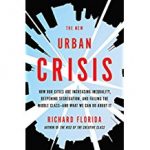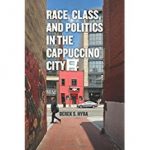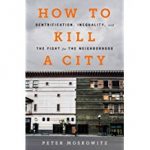Even as newscasters were reporting Donald Trump’s determination to withdraw the US from compliance with the Paris climate  accord with the pointed remark, “I was elected to represent the citizens of Pittsburgh, not Paris,” a former Carnegie-Mellon professor, Richard Florida, was appearing on “The News Hour” explaining to Paul Solman the fundamentals of his new book, The New Urban Crisis. What surely was a coincidence in timing nonetheless points up a central challenge in American politics and policy.
accord with the pointed remark, “I was elected to represent the citizens of Pittsburgh, not Paris,” a former Carnegie-Mellon professor, Richard Florida, was appearing on “The News Hour” explaining to Paul Solman the fundamentals of his new book, The New Urban Crisis. What surely was a coincidence in timing nonetheless points up a central challenge in American politics and policy.
Not surprisingly, Pittsburgh’s establishment, Democratic to the core, reacted strongly against Trump’s use of their city to make a decision they vehemently opposed. Drawing on Trump’s own campaign rhetoric, Pittsburgh Mayor Bill Peduto defended the city he declared “has finally bounced back from decades of industrial carnage,” saying it “would do all it can to promote its own environmental standards.” A city that has well overcome the environmental degradation once associated with industrial production (“Smokes Makes Prosperity, even if you choke on it” the classic 1939 film “The City” intones over images of Pittsburgh’s smokestack economy) is now both clean and productive.
Where support for Trump’s action emerged from the region, it came not surprisingly from Republicans, notably first term congressman Keith Rothfus. A narrow victor in 2016 in the adjacent 12th district, Rothfus declared, “In applauding President Trump’s move today, I stand with Western Pennsylvania manufacturers, boilermakers, power plant workers, railroad workers, truckers and miners in opposition to the Washington and global elites who want to concentrate power in their own hands.”
It’s an old argument: “globalizing elites” vs. the middle class, dating back at least as far as William Tucker’s 1982 volume, Progress and Privilege. What Trump signified in citing Pittsburgh and Youngstown and Detroit were not the cities themselves—all of which voted heavily against him—but the pockets of workers,many of them former jobholders in industrial plants now long gone,who live in those cities’ larger metropolitan regions. That’s Trump country, or was in 2016, and Trump is counting on cementing their allegiance symbolically if not with the immediate prospect of new industrial jobs. The evidence for his approach is there in the region: new jobs require high levels of education and are emerging in population centers, not the outer lying portions of metropolitan areas. Which takes us to Richard Florida.
His PBS interview clearly predated Trump’s announcement, or he too might have felt compelled to weigh in by pointing to the environmental measures and investments that have made Pittsburgh both attractive and the kind of center of innovation that sets the city apart from the surrounding hinterland. Indeed, Pittsburgh has owed its recent success in large part to a phenomenon Florida popularized through his highly influential, if controversial 2002 book, The Rise of the Creative Class. Urging cities to invest in conditions—talent, technology, and tolerance–that would attract the kind of creative residents that would drive innovation, Florida embraced changes already underway bringing a new generation of bright young people into city centers.
Yesterday, Florida told Paul Solman he was surprised at the rate the creative class has concentrated in cities and the extent of its impact. From that success, he realized, stemmed a new crisis. As cities adapted to the new global challenges in technology, the economy grew, but it als
 o bifurcated. In a series of maps Florida created for the Martin Prosperity Institute at the University of Toronto, where he is now located, he showed the parallel growth of the creative and service sectors, while noting a corresponding loss of blue collar workers. Indeed, in preferred areas at the urban core, population concentrated, housing prices rose, and inequality acquired a new physical dimension. Indeed, even as Florida’s book was appearing, in Washington, D.C., “Chocolate City” was becoming “Cappuccino City,” in Derick Hyra’s apt phrase, and in not just San Francisco, New York, and New Orleans, but also Detroit, of all places,” Peter Moskowitz claimed, gentrification was showing “How to Kill a City.” Not just the problem of such cities, Florida argues, “the new inequality is the central crisis of capitalism today. The very force that propels our economy divides us and pulls us apart….”
o bifurcated. In a series of maps Florida created for the Martin Prosperity Institute at the University of Toronto, where he is now located, he showed the parallel growth of the creative and service sectors, while noting a corresponding loss of blue collar workers. Indeed, in preferred areas at the urban core, population concentrated, housing prices rose, and inequality acquired a new physical dimension. Indeed, even as Florida’s book was appearing, in Washington, D.C., “Chocolate City” was becoming “Cappuccino City,” in Derick Hyra’s apt phrase, and in not just San Francisco, New York, and New Orleans, but also Detroit, of all places,” Peter Moskowitz claimed, gentrification was showing “How to Kill a City.” Not just the problem of such cities, Florida argues, “the new inequality is the central crisis of capitalism today. The very force that propels our economy divides us and pulls us apart….”
Which takes us back to Trump. According to his reading of the Paris Accord, the United States economy has been burdened by unfair obligations which, once abandoned, will unleash new jobs. Such prospects seem farfetched under any of the policies Trump has embraced. So does Florida have a solution? One cause he embraced on the “News Hour” was that of mass transit, enabling workers to gain access to centrally located jobs from outer parts of metropolitan areas. In essence, Florida was addressing the well discussed issue of spatial mismatch. Jobs are not always located close to housing at rates affordable to those who would fill them. But would mass transit help the former steel worker in the Mon Valley, or his children, if they lacked the education or training to fill a job in finance or medicine in central Pittsburgh?
Democrats have generally embraced both the global and the knowledge economies, while at the same time maintaining their allegiance to those less well off in America through commitments to maintaining social welfare programs. That explains how the party has maintained its dominance in cities like New York where inequality is most marked, but Democrats have been losing ground with those in the middle income ranges who have already been marginalized by that economy. Trump has wagered that short-term gains in employment are worth the damage that deregulation poses to the environment. The challenge for Democrats now, as Jerry Brown suggested in his response to Trump on the “News Hour” last night, is to extend the prosperity that has come from investments in new energy and the health and welfare benefits of environmental remediation beyond city limits to those who had yet to benefit or be convinced that this is the only reasonable path to take in at a critical point in the battle against global warming.